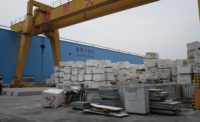The company was founded in 1968, by noted Brazilian businessman, Camilo Cola, who has made it his mission to protect the environment surrounding his operations. With this in mind, the company took on a new responsibility several years ago — to grow trees around its production units — from the quarries to the main office surroundings.
Today the company is proud to have incorporated more than 100,000 trees, including native, fruit-bearing and exotic species. One type of tree, in particular, is the “Pau-Brasil” — the tree that gave its name to the country 500 years ago.
As environmental laws in Brazil have continued to develop, Marbrasa reports that it has already been recovering extraction areas as well as the ciliary (wet, subtropical) forest near the quarries in order to avoid erosion, improve water quality and protect local fauna. “We are proud to be a reference of environment protection in our business,” said Elvis Gomes, Marbrasa’s CEO.
Today, Marbrasa grows four times as many trees than what is required by Brazilian law. “It is not only the quantity of trees, but also a variety of species that is important to build a healthy and well-balanced environment,” explained Giselle Intra, Environment Manager for Marbrasa.
Marbrasa has tree nurseries close to the quarries, where growing seedlings are given special care until they are resistant enough to be transferred to their final planting location. Seeds, plants and seedlings are offered to employees and communities around the quarries.
At the San Gabriel Black granite quarry — one of the world’s largest granite quarries — 30,000 trees have been planted. Another 76,000 trees are being planted around other quarries and in Permanent Protection Areas (PPA), where they are permanently protected by law.
Marbrasa is already planning to continue its pattern of environmental stewardship well into the future. The company is currently in the process of building a new industrial plant closer to the quarries. This new facility should produce twice the current capacity of the company.
Although equipment for the new plant has not been installed, Cola has already guaranteed a central place for the trees that, in the future, will be in harmony with the machinery and the stone. This green location has been affectionately nicknamed “Central Park.”
The company also performs selective trash collection, and part of the residue produced is sent to recycle industries. This operation reduces pollution, protects the environment and generates income for those involved in the process.









